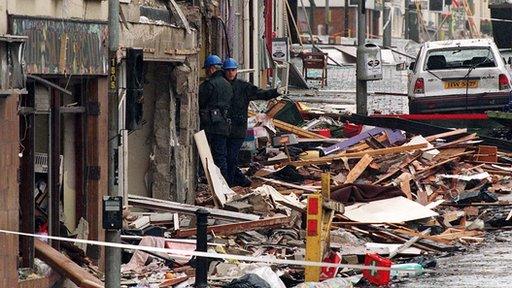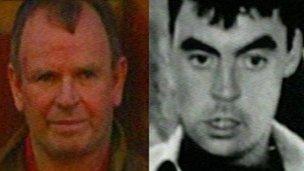Omagh bomb: Colm Murphy and Seamus Daly found liable at retrial
- Published

Twenty-nine people, including a woman pregnant with twins, were killed in the bombing
Two men who were sued over the Omagh bomb have been found liable for the 1998 atrocity at their civil retrial.
The judge described the evidence against Colm Murphy and Seamus Daly as overwhelming.
The action was taken by the victims' families, who have been awarded £1.6m damages.
Twenty-nine people, including a woman pregnant with twins, were killed in the Real IRA attack on the County Tyrone town in August 1998.
Delivering his summary, Mr Justice Gillen recognised the scale of the terrorist outrage for which no one has ever been convicted.
"The barrier of time has not served to disguise the enormity of this crime, the wickedness of its perpetrators and the grief of those who must bear its consequences," he said.
"Even 15 years on nothing can dilute the pulsing horror of what happened."
Lord Brennan QC, who represented the families, said the bereaved relatives were determined that the damages would be paid.
"Enforcement will be pursued with vigour here and in other relevant jurisdictions," he said.
Michael Gallagher, whose son Aidan was killed in the bombing, described it as an "important judgement".
"We will be pursuing the judgement because it would be a very hollow judgement if it was merely words," he said.
"We will be doing our best to try and recover the damages but at the moment, we're just happy that we've got a judgement that we, the families, the victims, have held someone to account for what happened at Omagh."
Circumstantial evidence
During the retrial it was claimed that Colm Murphy supplied mobile phones to the bomb team.
Mr Justice Gillen said there was compelling circumstantial evidence that two phones linked to Colm Murphy were used in the attack, with anyone who knowingly provided them to the bomb team liable.
The builder's denials about lending his phone to anyone and subsequent explanation to police in the Irish Republic were wholly implausible and amounted to lies with no innocent explanation, according to the judge.
The coincidence of a similar unexplained use by the same phone in an earlier bombing in Banbridge was found to amount to further probative evidence of Murphy's involvement in the Omagh operation.
"To suggest that for a second time his phone had been mysteriously used without his knowledge moves one into the realm of fantasy," Mr Justice Gillen said.

Colm Murphy and Seamus Daly have been found liable for the Omagh bomb at their civil retrial
He described Mr Murphy's explanation for failing to give evidence as being due to his lack of confidence in the judicial system as "bordering on the risible".
"It makes the prima facie case even stronger and renders it now overwhelming," he added.
The same verdict was returned against Seamus Daly, based on his conversation on one of the bomb-run phones less than an hour after the explosion.
Mr Daly's guilty plea and conviction for Real IRA membership in November 2000 was also taken into account.
"This was relevant not just to propensity but was logically probative in determining the issue of liability in this case," Mr Justice Gillen said.
Involvement
Neither man was at the High Court in Belfast to hear the 73-page judgement.
"I have determined that both defendants were involved in assisting the preparation, planting and detonation of the bomb," Mr Justice Gillen said.
Stanley McCombe, who lost his wife Ann in the atrocity, said he hoped the Police Service of Northern Ireland and the Garda Siochana in the Republic would now review the evidence following the verdict.
"Out of all this, what we have heard from the judge, I think the Gardai, PSNI, and the bodies that be, have to really look at all this information and all this evidence and see if there is a case that these people have to answer for," he said.
Mr Gallagher said the Omagh families would be seeking an "early meeting" with the PSNI chief constable, Matt Baggott.
"We believe it's important that he looks at the judgement that was delivered, that there could be the possibility of pursuing the individuals that we have held to account in a criminal court," he said.
"We just cannot accept that 31 people can be murdered and no-one can be brought to justice for that crime."
Following the verdict, Lord Brennan QC, said he wanted the nine-year-long legal battle brought to an end.
Opposing a stay on the judgment pending any further challenge, the barrister described the verdict against Mr Murphy and Mr Daly as "damning".
"The prospects on appeal are, in our submission, zero," he said.
"The defendants have had their full measure of legal aid and the ability to participate in this trial. Let it come to an end."
The barrister also confirmed plans to pursue all four men now held liable for the bombing.
To date, no-one has been successfully criminally prosecuted for the bombing.
In the absence of criminal convictions, the victims' families took a landmark civil action, seeking damages from the men they believed were responsible.
The retrial followed the original Omagh bomb civil case, which is believed to be the first time anywhere in the world that alleged members of a terrorist organisation have been sued.
Damages
The first trial concluded in June 2009, when a judge ruled that four men - Real IRA leader Michael McKevitt, Liam Campbell, Colm Murphy and Seamus Daly - were all responsible for carrying out the atrocity.
The 12 relatives who had taken the action were awarded more than £1.6m in damages.
Mr McCombe said the families had not received "one single penny" from that judgement.
However, the four men who were found liable subsequently launched appeals.
Michael McKevitt and Liam Campbell failed to have the civil judgement against them overturned two years later.
Colm Murphy and Seamus Daly were successful in upholding their appeals in July 2011, but the pair were then ordered to face a retrial of the civil case.
Mr Murphy a Dundalk-based publican and contractor, and former employee Seamus Daly, from Cullaville, County Monaghan, denied playing central roles in the atrocity.